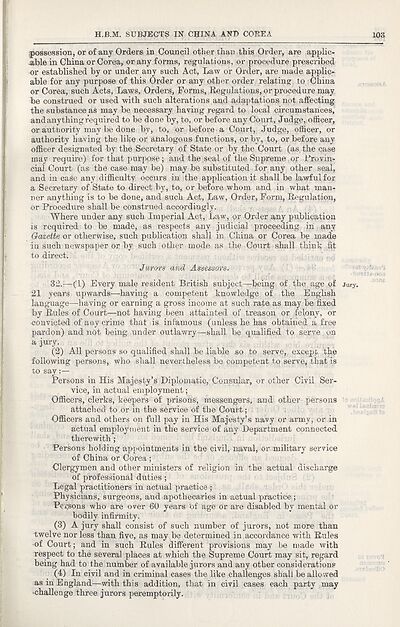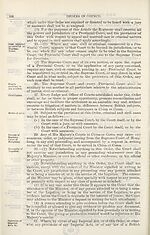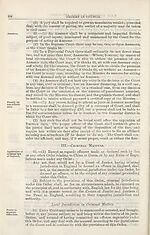1933
(155) Page 103
Download files
Complete book:
Individual page:
Thumbnail gallery: Grid view | List view

H.B.M. SUBJECTS IN CHINA AND COBEA
103
possession, or of any Orders in Council other than this Order, are applic¬
able in China or Corea, or any forms, regulations, or procedure prescribed
or established by or under any such Act, Law or Order, are made applic¬
able for any purpose of this Order or any other order relating to China
or Corea, such Acts, Laws, Orders, Forms, Regulations, or procedure may
be construed or used with such alterations and adaptations not affecting
the substance as may be necessary having regard to local circumstances,
and anything required to be done by, to, or before any Court, Judge, officer,
or authority may be done bv, to, or before a Court, Judge, officer, or
authority having the like or analogous functions, or by, to, or before any
officer designated by the Secretary of State or by the Court (as, the case
may require) for that purpose; and the seal of the Supreme or Provin¬
cial Court (as the case may be) may be substituted for any other seal,
and in case any difficulty occurs in the application it shall be lawful for
a Secretary of State to direct by, to, or before whom and in what man¬
ner anything is to be done, and such Act, Law, Order, Form, Regulation,
or Procedure shall be construed accordingly.
Where under any such Imperial Act, Law, or Order any publication
is required to be made, as respects any judicial proceeding in any
Gazette or otherwise, such publication shall in China or Corea be made
in such newspaper or by such other mode as the Court shall think fit
to direct.
Jurors and Assessors.
32.—(1) Every male resident British subject—being of the age of jury.
21 years upwards—having a competent knowledge of the English
language—having or earning a gross income at such rate as may be fixed
by Rules of Court—not having been attainted of treason or felony, or
convicted of any crime that is infamous (unless he has obtained a free
pardon) and not being under outlawry—shall be qualified to serve on
a jury.
(2) All persons so qualified shall be liable so to serve,, except the
following persons, who shall nevertheless be competent to serve, that is
to say:—
Persons in His Majesty’s Diplomatic, Consular, or other Civil Ser¬
vice, in actual employment;
Officers, clerks, keepers of prisons, messengers, and other persons
attached to or in the service of the Court;
Officers and others on full pay in His Majesty’s navy or army, or in
actual employment in the service of any Department connected
therewith;
Persons holding appointments in the civil, naval, or military service
of China or Corea ;
Clergymen and other ministers of religion in the actual discharge
of professional duties ;
Legal practitioners in actual practice ;
Physicians, surgeons, and apothecaries in actual practice;
Persons who are over 60 years Of age or are disabled by mental or
bodily infirmity.
(3) A jury shall consist of such number of jurors, not more than
twelve nor less than five, as may be determined in accordance with Rules
of Court; and in such Rules different provisions may be made with
respect to the several places at which the Supreme Court may sit, regard
being had to the number of available jurors and any other considerations
(4) In civil and in criminal cases the like challenges shall be allowed
as in England—with this addition, that in civil cases each party may
challenge three jurors peremptorily.
103
possession, or of any Orders in Council other than this Order, are applic¬
able in China or Corea, or any forms, regulations, or procedure prescribed
or established by or under any such Act, Law or Order, are made applic¬
able for any purpose of this Order or any other order relating to China
or Corea, such Acts, Laws, Orders, Forms, Regulations, or procedure may
be construed or used with such alterations and adaptations not affecting
the substance as may be necessary having regard to local circumstances,
and anything required to be done by, to, or before any Court, Judge, officer,
or authority may be done bv, to, or before a Court, Judge, officer, or
authority having the like or analogous functions, or by, to, or before any
officer designated by the Secretary of State or by the Court (as, the case
may require) for that purpose; and the seal of the Supreme or Provin¬
cial Court (as the case may be) may be substituted for any other seal,
and in case any difficulty occurs in the application it shall be lawful for
a Secretary of State to direct by, to, or before whom and in what man¬
ner anything is to be done, and such Act, Law, Order, Form, Regulation,
or Procedure shall be construed accordingly.
Where under any such Imperial Act, Law, or Order any publication
is required to be made, as respects any judicial proceeding in any
Gazette or otherwise, such publication shall in China or Corea be made
in such newspaper or by such other mode as the Court shall think fit
to direct.
Jurors and Assessors.
32.—(1) Every male resident British subject—being of the age of jury.
21 years upwards—having a competent knowledge of the English
language—having or earning a gross income at such rate as may be fixed
by Rules of Court—not having been attainted of treason or felony, or
convicted of any crime that is infamous (unless he has obtained a free
pardon) and not being under outlawry—shall be qualified to serve on
a jury.
(2) All persons so qualified shall be liable so to serve,, except the
following persons, who shall nevertheless be competent to serve, that is
to say:—
Persons in His Majesty’s Diplomatic, Consular, or other Civil Ser¬
vice, in actual employment;
Officers, clerks, keepers of prisons, messengers, and other persons
attached to or in the service of the Court;
Officers and others on full pay in His Majesty’s navy or army, or in
actual employment in the service of any Department connected
therewith;
Persons holding appointments in the civil, naval, or military service
of China or Corea ;
Clergymen and other ministers of religion in the actual discharge
of professional duties ;
Legal practitioners in actual practice ;
Physicians, surgeons, and apothecaries in actual practice;
Persons who are over 60 years Of age or are disabled by mental or
bodily infirmity.
(3) A jury shall consist of such number of jurors, not more than
twelve nor less than five, as may be determined in accordance with Rules
of Court; and in such Rules different provisions may be made with
respect to the several places at which the Supreme Court may sit, regard
being had to the number of available jurors and any other considerations
(4) In civil and in criminal cases the like challenges shall be allowed
as in England—with this addition, that in civil cases each party may
challenge three jurors peremptorily.
Set display mode to:
![]() Universal Viewer |
Universal Viewer | ![]() Mirador |
Large image | Transcription
Mirador |
Large image | Transcription
Images and transcriptions on this page, including medium image downloads, may be used under the Creative Commons Attribution 4.0 International Licence unless otherwise stated. ![]()
| Asian directories and chronicles > 1933 > (155) Page 103 |
|---|
| Permanent URL | https://digital.nls.uk/203676326 |
|---|
| Attribution and copyright: |
|
|---|---|
| Description | Volumes from the Asian 'Directory and Chronicle' series covering 1917-1941, but missing 1919 and 1923. Compiled annually from a multiplicity of local sources and research. They provide listings of each country's active corporations, foreign residents and government agencies of all nationalities for that year, together with their addresses. Content includes: various treaties; coverage of conflicts; currencies and taxes; consular fees; weights and measures; public holidays; festivals and traditions. A source of information for both Western states and communities of foreigners living in Asia. Published by Hongkong Daily Press. |
|---|---|
| Shelfmark | H3.86.1303 |
| Additional NLS resources: |

